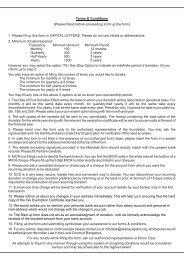The Top 100 NGOs 2013. - Akshaya Patra
The Top 100 NGOs 2013. - Akshaya Patra
The Top 100 NGOs 2013. - Akshaya Patra
Create successful ePaper yourself
Turn your PDF publications into a flip-book with our unique Google optimized e-Paper software.
among populations without striving for uniformity between<br />
them. For a relatively brief period, between the early 16th<br />
and early 20th centuries, some of those empires were the<br />
outgrowths of confidently national cultures, particularly in<br />
Europe and Asia. But most were pre-national or supranational<br />
in composition. Oceanic spaces connected elements of these<br />
empires in the modern period, but maritime arenas such as<br />
the Mediterranean, the Indian Ocean, the Atlantic and the<br />
Pacific also segmented sovereignties and became cockpits of<br />
inter-imperial rivalry.<br />
‘In light of the long history<br />
of empire, the eternal world<br />
of states posited by modern<br />
ideas about international<br />
relations seems fleeting, even<br />
marginal.’<br />
In light of the long history of empire, the eternal world of<br />
states posited by modern ideas about international relations<br />
seems fleeting, even marginal. Indeed, if by some estimates a<br />
world of true nation-states, detached from empire, emerged<br />
only with the zenith of decolonization, soon to be swept away<br />
by the wave of transnationalism that erupted after the end<br />
of the Cold War, then the heyday of the state lasted less than<br />
a generation, from about 1975-1989. All history, before and<br />
after, was either pre-national or post-national history.<br />
By simultaneously uniting and dividing, empires spurred<br />
a contest between ideas and facilitated their circulation<br />
amongst diasporic peoples and across commercial<br />
routes. From such collisions and transmissions emerged<br />
universalizing forces that were in competition – empire,<br />
religion and political economy, for instance – as well as the<br />
expansive ideologies that countered or subsumed them: pan-<br />
Islamism, pan-Africanism, nationalism, anti-colonialism,<br />
and other forms of ‘colored cosmopolitanism’. Most of these<br />
movements were invisible as long as history was viewed<br />
through nation-shaped spectacles. <strong>The</strong>y returned to view only<br />
when older experiences of space – more extensive, more fluid<br />
and less confined by territorial boundaries – again framed<br />
questions about the past.<br />
<strong>The</strong> field is rife with spatial metaphors – of ideas as<br />
“migratory” and of books escaping the bounds of nations;<br />
of “horizons” of understanding and the public sphere; of<br />
“localism” and “provincialism” as adjectives for ideas; and of<br />
conceptions of “containment” and critical “movement” in the<br />
reading and interpretation of texts. Yet such figures of speech<br />
do not necessarily indicate any substantive engagement with<br />
questions of space and place. Instead, they are a shorthand<br />
shorT essay shorT essay<br />
<strong>The</strong> gloBal Journal + January & FeBruary 2013<br />
indication that ideas lack material locations – that they<br />
need to be placed into contexts construed almost entirely<br />
as temporal and linguistic, not physical or spatial. Michel<br />
Foucault might have been speaking for intellectual historians<br />
specifically (rather than all historians more broadly) when<br />
he declared, “space was that which was dead, fixed, non<br />
dialectical, immobile. On the other hand, time was rich,<br />
fertile, vibrant, dialectical.”<br />
Space can be understood intensively as well as extensively. In<br />
this regard, historians of science may have much to teach both<br />
international relations scholars and intellectual historians.<br />
A ‘spatial turn’ in the history of science put in doubt the<br />
universality of truth and insisted upon local knowledge: there<br />
could be no view from nowhere when every view sprang from<br />
somewhere. Ideas emerged from tightly defined spaces – from<br />
picturesque beaches as well as laboratory benches, and from<br />
public drinking-houses as well as royal academies.<br />
‘We need to understand<br />
how ideas travel, who<br />
transports them, what<br />
baggage they carry on their<br />
journeys, and how they<br />
become domesticated and<br />
naturalized on arrival.’<br />
When viewed microscopically in this way, the seamless<br />
web of abstract knowledge turned out to be a brittle mosaic<br />
of contingent concerns. If one aim of this literature was<br />
to debunk the presumed universality of scientific reason,<br />
another was to show just how fragments of knowledge were<br />
accumulated and collected, and how their credibility was<br />
secured. We need to understand how ideas travel, who<br />
transports them, what baggage they carry on their<br />
journeys, and how they become domesticated and<br />
naturalized on arrival.<br />
This approach revealed the intricate mechanisms of<br />
information gathering that made scientific knowledge both<br />
possible and plausible. Even the most physically isolated of<br />
thinkers – like the land-locked Isaac Newton, who never saw<br />
the sea in his life – could become a global center of calculation<br />
by commanding a worldwide web of correspondents from the<br />
Gulf of Tonkin to the Strait of Magellan. Corporate bodies<br />
such as the Society of Jesus and the English and Dutch<br />
East India Companies facilitated big science, in the sense<br />
of the long-distance production of knowledge. And later<br />
‘webs of empire’ dissolved distinctions between centers and<br />
peripheries as each alleged periphery earned a central place<br />
in accumulating imperial archives, testing hypotheses, and<br />
generating ideologies through inter-colonial exchanges.<br />
As a result, extensively elaborated connections linked<br />
intensively cultivated locations to create new maps<br />
of knowledge and transnational canons through the<br />
transmission of ideas and information across continents<br />
and oceans.<br />
<strong>The</strong>se studies in what Pierre Bourdieu calls the “science of<br />
international relations with regard to culture” offer models for<br />
intellectual history that are more generally replicable. When<br />
conceptions of space expand, webs of significance ramify and<br />
networks of exchange proliferate to create novel contexts and<br />
unanticipated connections among them. Shifting patterns of<br />
sociability and correspondence, of the distribution of books<br />
and the spatial organization of knowledge – in rooms and<br />
buildings, streets and squares, cities and regions, countries<br />
and continents, empires and oceans – forced thinkers to<br />
rethink the nature of their audiences, the potential impact of<br />
their arguments, and the extent of their spheres of action.<br />
In light of such considerations, the questions posed by<br />
intellectual historians have shifted. <strong>The</strong>y once asked what<br />
Enlightenment was. To answer that query, intellectual<br />
historians attuned to space must now ask where<br />
Enlightenment was. This is only fully answerable in a global<br />
context across what historians call the longue durée – a view<br />
of history that focuses on unchanging or very slow-changing<br />
phenomena over the gradual march of centuries, rather than<br />
years or decades.<br />
‘Changing conceptions of<br />
space expanded the contexts<br />
for ideas and, with them, the<br />
very possibilities for thought.’<br />
Changing conceptions of space expanded the contexts for<br />
ideas and, with them, the very possibilities for thought. <strong>The</strong><br />
most familiar example for European intellectual historians<br />
might be the broader contexts that transoceanic exploration<br />
and colonization generated for thinkers in early modern<br />
Europe. Intercultural encounters and the proliferation of<br />
empires around the Indian Ocean, the Atlantic world, and,<br />
later, the Pacific, tested conceptions of nature, civilization,<br />
political community, property, religious diversity and<br />
toleration. John Locke – a voracious reader of travel<br />
literature – confronted instances of diversity in belief and<br />
practice drawn from accounts of five continents; Thomas<br />
Hobbes, a more modest consumer of Americana, shaped his<br />
<strong>The</strong>gloBalJournal.neT<br />
24 25<br />
understanding of international relations by reference<br />
to ethnographic descriptions of the state of nature; and<br />
David Hume’s political economy owed much to his<br />
Atlantic connections.<br />
‘As the ‘Great Map of<br />
Mankind’ was unrolled, in<br />
Edmund Burke’s resonant<br />
phrase, truly global<br />
possibilities for thought<br />
opened up for the generations<br />
of thinkers writing after the<br />
mid-18th century.’<br />
As the “Great Map of Mankind” was unrolled, in Edmund<br />
Burke’s resonant phrase, truly global possibilities for thought<br />
opened up for the generations of thinkers writing after the<br />
mid-18th century – among them Denis Diderot, Anne-<br />
Robert-Jacques Turgot, Adam Smith, Immanuel Kant,<br />
Johann Gottfried Herder, Jeremy Bentham and Burke<br />
himself. This had consequences for their constructions<br />
of universalism and cosmopolitanism, as well as for their<br />
conceptions of culture and difference.<br />
Moving into the later 19th century, the compression of<br />
space by technology – above all the steamship, the railway<br />
and the telegraph – made new forms of political community<br />
imaginable over the expanses of empire and across the world.<br />
With due respect to Foucault, space was dynamic, not static.<br />
<strong>The</strong> contexts for thinking expanded to encompass the entire<br />
globe. Accordingly, modern intellectual historians have to<br />
track ideas on ever-larger scales: continental, inter-regional,<br />
transoceanic, and ultimately, planetary. As Martin Heidegger,<br />
Carl Schmitt, and Hannah Arendt were among the first to<br />
note in the mid-20th century, outer space may truly be the<br />
final frontier for intellectual history.<br />
* * * * *<br />
While these thinkers explored the changing shapes<br />
of empire, nation and people, another, more<br />
ancient variety of international utopianism, was<br />
being revived. <strong>The</strong> first practitioners of the history of ideas<br />
– from Thomas Stanley in mid-17th century England, to<br />
Victor Cousin in post Napoleonic France – produced works<br />
that were strikingly cosmopolitan in character and content.<br />
Intellectual history was born international, and it remained<br />
so long after the rise of nationalism within and beyond the





